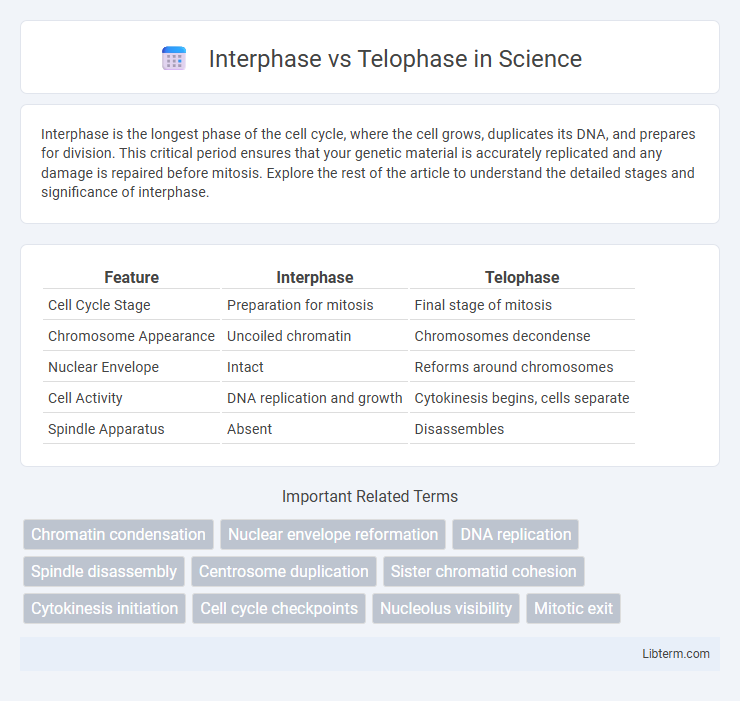Interphase is the longest phase of the cell cycle, where the cell grows, duplicates its DNA, and prepares for division. This critical period ensures that your genetic material is accurately replicated and any damage is repaired before mitosis. Explore the rest of the article to understand the detailed stages and significance of interphase.
Table of Comparison
| Feature | Interphase | Telophase |
|---|---|---|
| Cell Cycle Stage | Preparation for mitosis | Final stage of mitosis |
| Chromosome Appearance | Uncoiled chromatin | Chromosomes decondense |
| Nuclear Envelope | Intact | Reforms around chromosomes |
| Cell Activity | DNA replication and growth | Cytokinesis begins, cells separate |
| Spindle Apparatus | Absent | Disassembles |
Introduction to Cell Cycle Phases
Interphase is the longest phase of the cell cycle, during which the cell grows, replicates its DNA, and prepares for mitosis. In contrast, telophase marks the final stage of mitosis, where chromatids de-condense, nuclear membranes reform, and the cell prepares to divide completely. Understanding the distinct roles of interphase and telophase is crucial for grasping the overall process of cell division and growth.
Overview of Interphase
Interphase is the longest phase in the cell cycle, primarily dedicated to cell growth, DNA replication, and preparation for mitosis. During this phase, the cell synthesizes proteins and duplicates its chromosomes to ensure accurate cell division. Unlike telophase, where the cell completes mitosis by forming two daughter nuclei, interphase involves metabolic activity and cellular organelle duplication without visible chromosome condensation.
Overview of Telophase
Telophase is the final stage of mitosis where chromosomes begin to decondense, and the nuclear envelope re-forms around each set of separated sister chromatids, creating two distinct nuclei. The mitotic spindle disassembles, and cytokinesis often starts during this phase, leading to the division of the cytoplasm. This stage ensures proper segregation of genetic material and sets the stage for the cell to enter the next interphase.
Key Differences Between Interphase and Telophase
Interphase is the cell cycle phase where the cell prepares for division by replicating DNA and carrying out normal metabolic functions, while telophase is the final stage of mitosis where the chromosomes de-condense and nuclear envelopes reform. Interphase consists of the G1, S, and G2 phases focused on growth and DNA synthesis, whereas telophase involves the restoration of two distinct nuclei, marking the near completion of cell division. Key differences include interphase's role in preparation and growth compared to telophase's role in concluding mitosis and facilitating cytokinesis.
Cellular Activities During Interphase
During interphase, the cell undergoes critical growth and DNA replication, preparing for mitosis by synthesizing proteins and organelles essential for cell division. This phase includes the G1, S, and G2 stages, where the cell duplicates its chromosomes and checks for DNA damage to ensure accurate replication. In contrast, telophase marks the end of mitosis, where the chromosomes de-condense, nuclear envelopes re-form, and the cell prepares to split during cytokinesis.
Cellular Events Characterizing Telophase
Telophase is characterized by the reformation of the nuclear envelope around the separated sister chromatids, marking the end of chromosome segregation. During this phase, chromosomes begin to decondense into chromatin, and the nucleolus reappears, signaling a return to normal cellular activities. Cytokinesis often overlaps with telophase, completing cell division by physically separating the cytoplasm into two daughter cells.
Chromosomal Changes: Interphase vs Telophase
During interphase, chromosomes exist as loosely packed chromatin, allowing DNA replication and preparation for cell division. In telophase, chromatin condenses into distinct chromosomes that de-condense as the nuclear envelope reforms around them. The transition from interphase to telophase highlights dynamic chromosomal changes essential for accurate genetic material segregation.
Role in Cell Division: Comparison
Interphase serves as the preparation phase in cell division, where DNA replication and cell growth occur to ensure the cell is ready for mitosis. Telophase marks the final stage of mitosis, during which chromosomes de-condense, nuclear envelopes re-form around daughter nuclei, and the cell begins cytokinesis. The transition from interphase to telophase reflects a shift from cellular preparation and replication to chromosome segregation and the re-establishment of nuclear compartments.
Importance in Growth and Development
Interphase is crucial in growth and development as it prepares the cell by replicating DNA and increasing cellular organelles, ensuring each daughter cell has the necessary components for proper function. Telophase marks the end of cell division, re-establishing the nuclear envelope and enabling cytokinesis to physically separate the daughter cells, which supports tissue growth and regeneration. Both phases are essential for maintaining genetic stability and enabling multicellular organisms to grow, repair, and develop effectively.
Summary Table: Interphase vs Telophase
Interphase is characterized by DNA replication and cell growth, preparing the cell for division, whereas Telophase marks the final stage of mitosis where chromosomes de-condense and nuclear envelopes reform. During Interphase, the cell cycles through G1, S, and G2 phases, while Telophase involves re-establishing two distinct nuclei. The summary table highlights key differences such as chromatin state, spindle presence, and cytokinesis initiation.
Interphase Infographic

 libterm.com
libterm.com